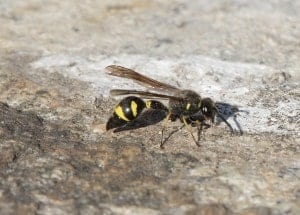The term “ground wasp” is quite broad and can be used when talking about many species (more than 8000). As you can tell from the name, they are united by the fact that they prefer to dig nests underground. These may include both safe and even useful species for farming and potentially harmful ones. An allergic reaction to insect bites is one of the most life-threatening.
In this article, I will tell you what kind of wasp builds a nest in the ground, give you my top 3 effective treatments, and explain what preventive measures you need to take so that wasps no longer appear on your site.
[wpsm_titlebox title=”How to Get Rid of Ground Wasps” style=”main”]
- Buy a special protective suit.
- Spray insecticide powders and dust.
- Use liquid insecticides.
- Place a wasp trap near the nest.
- Do not allow other insects to breed. Pick up fallen fruits and berries regularly and do not leave food on a table.
[/wpsm_titlebox]
What Are Ground Wasps?
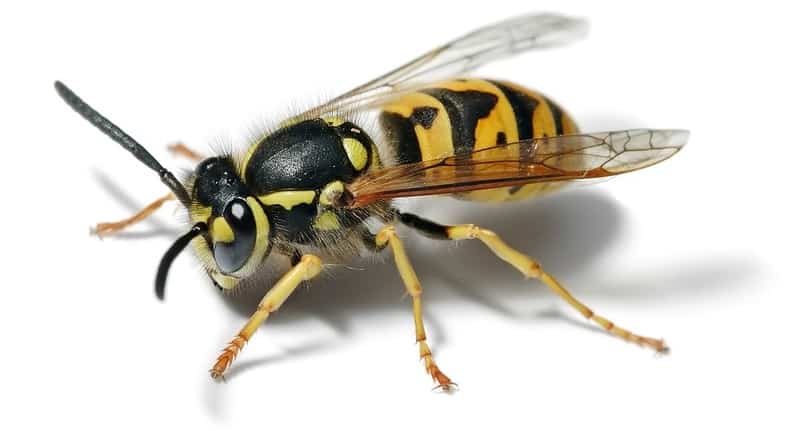
Representatives of this large family include all apocritan and hymenopteran insects. The ground wasps group comprises many species, but in North America, yellowjackets, sand wasps, digger wasps, spider wasps, scoliid wasps, and cicada killer wasps are the most common.
Ground wasp identification is not as difficult as it might sound. These are small creatures whose body length varies from 0.6 to 2 inches. They have a characteristic coloration consisting of stripes of yellow, red, brown, and black shades. At the end of the abdomen, female species have a sting with a poisonous gland.
All wasps can be divided into solitary and social groups. A solitary wasp female builds a nest only for itself; it provides itself with food and lays larvae alone. Social wasps live in groups (more than 500 insects) and serve a queen who directs them. They often sting people to protect their nest.

How Do Ground Wasps Appear in Your Garden?
A nest location depends on a queen’s preferences. If wasps appear on your site, it means that soil there is perfect for them. Do wasps live in the ground? Yes, their nest can be built in an abandoned wild animal hole, in an old anthill, or under tree roots. Besides, if the soil in your backyard is sandy or just quite loose, some types of wasps can dig tunnels themselves.
To understand the reasons for their appearance in your garden, you should consider their diet as well. Adult insects, like many other species of wasps, feed on soft berries and fruits. And if you do not regularly pick up fallen fruits from the ground, wasps can fly into the smell of fermented juice.
What Are Dangerous and What Are Useful Ground Wasps?
Most ground wasps can be useful in gardening. Since their larvae need protein food in the form of caterpillars, roaches, and butterflies, they simply destroy all harmful insects in your garden. For example, a cicada killer wasp, as the name implies, can help reduce cicada populations.
However, some wasps can be dangerous. European beewolf wasps feed on bees. They are capable of causing enormous damage to an apiary, as to feed one of their larvae, they need up to 6 bees.
The main danger of ground-dwelling wasps, primarily social species like yellow jackets, is their aggressiveness. They will actively defend their nest if they feel the slightest threat. Besides a huge pain effect, a wasp sting can cause a sharp dermatological reaction. With several bites, it is fraught with an allergic reaction, up to suffocation, and anaphylactic shock. Moreover, wasps do not die in the attack and can sting several times in a row.
How to Get Rid of Ground Wasps?
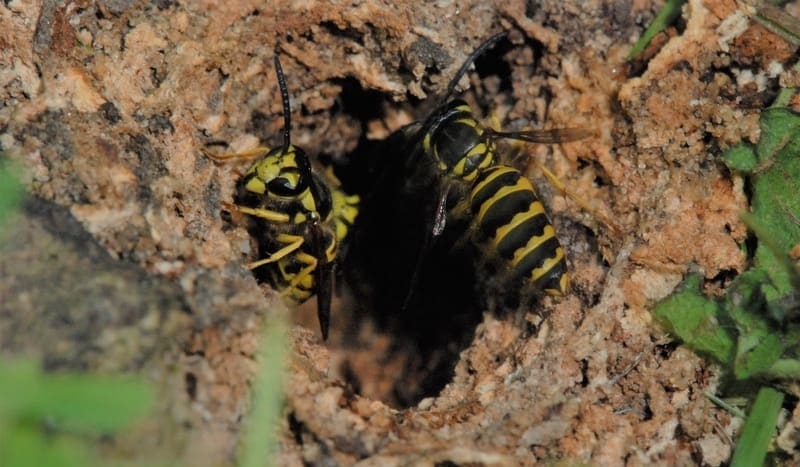
Of course, it is better to entrust this work to professionals and call a pest control service. So you will not put yourself at risk of being stung several times. However, you can get rid of wasps on your own; just prepare everything right.
First of all, get a special protective suit. Carry out this procedure in the evening, at night or early in the morning when wasps are less active. Inspect the area near the nest to make sure that it does not have another exit.
As their nests are deep underground, destroying them is not so simple. Wasp sprays, aerosols, gels, and foams will not cope with the task. But now on the market, you can find many other effective professional remedies for ground wasps.
Insecticide powders and dust
These are the most effective remedies in the fight against earthen wasps. With their help, you can process the nest, destroy both adults and larvae, and at the same time, not harm the plants in your area.
Both wasp powders and dust can be poured using their original bottles. However, it is recommended that you use them with dusters for more directional applications. Put the indicated amount of a product into a container, insert a tube tip into a hole and spray the remedy all over the nest.
Liquid insecticides
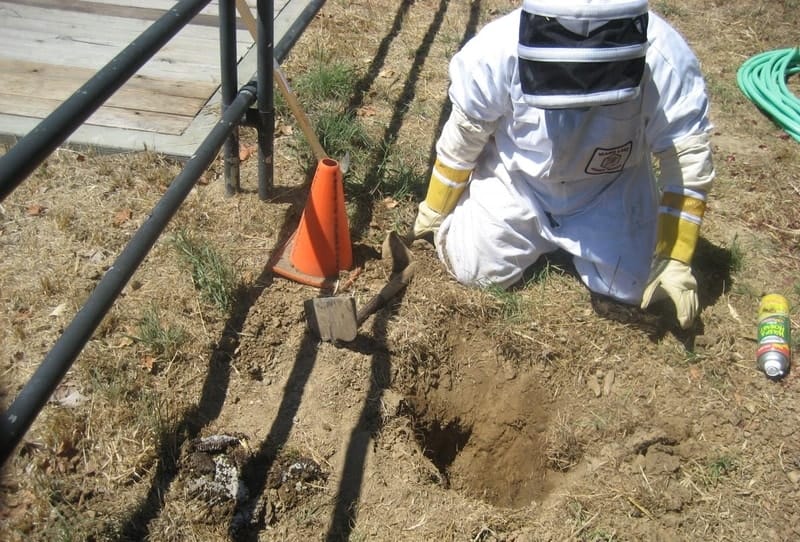
They are poured through the main hole directly into wasp nests. This tool kills all individuals inside and does not allow the flying insects to return. Since they are absorbed into the soil, they can harm plants. Therefore, be careful with the dosage. Most often, such products are sold in bottles with handy long nozzles and are ready for use.
Both liquid insecticides and dust contain active ingredients like pyrethrin, cypermethrin, and tetramethrin. Smash ground wasp nest with a shovel or rake as soon as insects stop flying near it.
Traps
There are many types of them. However, I recommend using them only in combination with the two previous remedies, since it kills only adults. Place a wasp trap near the nest so that the wasps fly by the smell.
Top 3 Ground Wasps Treatments
In this section, I will tell you about three excellent treatments against ground wasps. One of them is a handy duster tool, and two others are efficient insecticide powders.
1. Bellows Hand Duster — An Effective Tool for Killing Burrowing Wasps
[amazon box=”B004FBKLZE” template=”vertical” tracking_id=”how-to-get-rid-of-ground-wasps” button_text=”Check price on Amazon” button_detail=”https://shareasale.com/r.cfm?b=410159&u=2583381&m=43235&urllink=www%2Edomyown%2Ecom%2Fbellow%2Dhand%2Dduster%2Dp%2D106%2Ehtml&afftrack=how%20to%20get%20rid%20of%20ground%20wasps” button_detail_text=”Check price on DoMyOwn”]
Specifications:
- Item Shape: Round Bellow
- Material: Rubber
- Item Weight: 7.2 Ounces
- Package Dimensions: 4.4 x 9.5 x 2.75 inches
- Product has a 6-inch extension
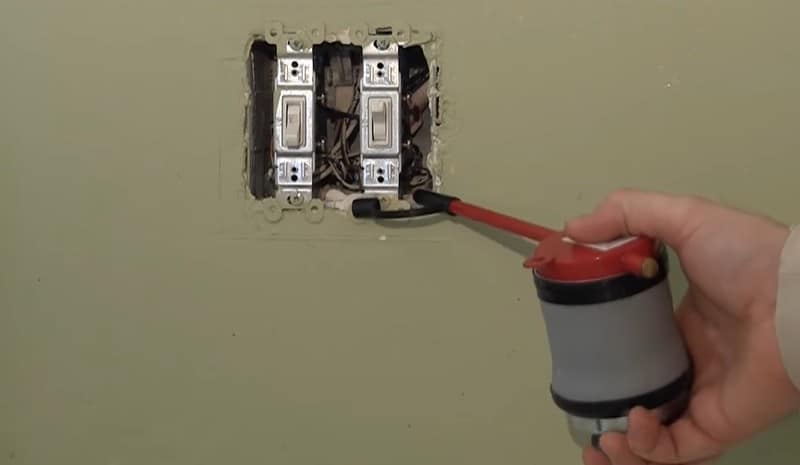
One of the most convenient and practical devices for destroying ground wasps’ nests is the Bellows Hand Duster. It consists of a rubber siphon with a volume of about 110 g and an elongated metal tube with a narrow end (6 inches long). This design allows you to spray remedies even in hard to reach places. The container should not be filled with dust to the full; there should be enough free space for proper spraying.
| Pros: | Cons: |
|
|
2. Tempo Dust Insecticide BA1011 — Eliminate Wasps That Live in the Ground
[amazon box=”B004H4CC7Y” template=”vertical” tracking_id=”how-to-get-rid-of-ground-wasps” button_text=”Check price on Amazon” button_detail=”https://shareasale.com/r.cfm?b=410159&u=2583381&m=43235&urllink=www%2Edomyown%2Ecom%2Ftempo%2Ddust%2Dp%2D391%2Ehtml&afftrack=how%20to%20get%20rid%20of%20ground%20wasps” button_detail_text=”Check price on DoMyOwn”]
Specifications:
- Active Ingredient: Cyfluthrin 1%
- Coverage Area: 0.5 to 1 lb. per 1,000 sq. ft.
- Item Weight: 1.38 pounds
- Package Dimensions: 2.5 x 3.8 x 9.55 inches
- Target pests: Ants, Bees, Carpenter Bees, Hornets, Roaches, Wasps and others
Tempo Dust Insecticide BA1011 contains 1% cyfluthrin, which perfectly copes with the destruction of small insects, including ground wasps. Use it with the Bellows Hand Duster to process nests. Recommended consumption is no more than 1 lb per 1000 square feet.
Be careful when using it because the active ingredient cyfluthrin is toxic and can cause nausea and headache in large quantities.
| Pros: | Cons: |
|
|
3. Sevin Ready-to-Use 5% Dust — An Insecticide Powder for Getting Rid of Ground Wasps
[amazon box=”B006O8OWFG” template=”vertical” tracking_id=”how-to-get-rid-of-ground-wasps”]
Another tool that can be used with a duster is Sevin Ready-to-Use 5% Dust. 5% carbaryl insecticide in the composition effectively fights harmful insects and has a long-lasting effect. However, it can also harm beneficial insects, such as bees, ground beetles, and earthworms. That is why I recommend using it pointwise to destroy wasp nests only.
| Pros: | Cons: |
|
|
How to Prevent Ground Wasps in the Future?
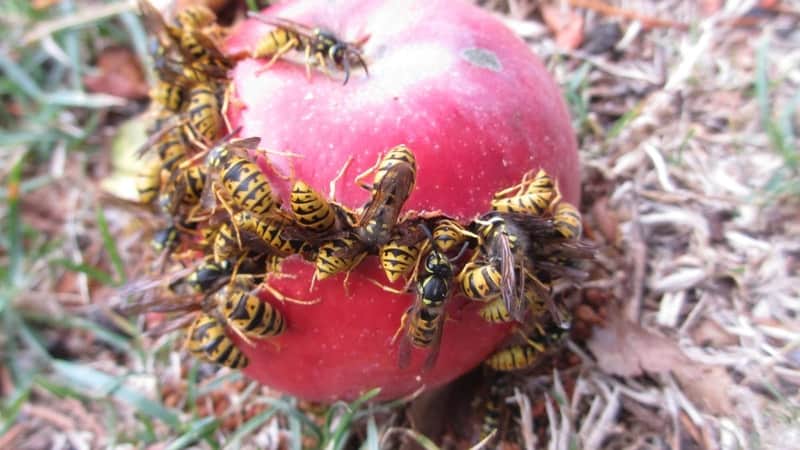
To prevent ground wasps from appearing on your site again, do not allow the reproduction of other insects that may attract them. Pick up fallen fruits and berries regularly and do not leave food on a table.
Close garbage bins with food waste tightly and keep them away from your house. From time to time, inspect your backyard for holes of other insects or rodents; destroy them to prevent wasps from settling inside.
Ground Nesting Wasps FAQs
Here I’ve picked three most essential questions about ground wasps that my readers usually ask.
What does a ground wasp nest look like?
Finding wasp nest in the ground is not difficult; it is very different from anthills. Usually, they look like a small cone-shaped pile of mud with a large entrance at the top. Since these wasps can also settle in cracks in the ground or rodent burrows, their nests are not so noticeable. You will have to observe their behavior a little to determine the location of the nest.
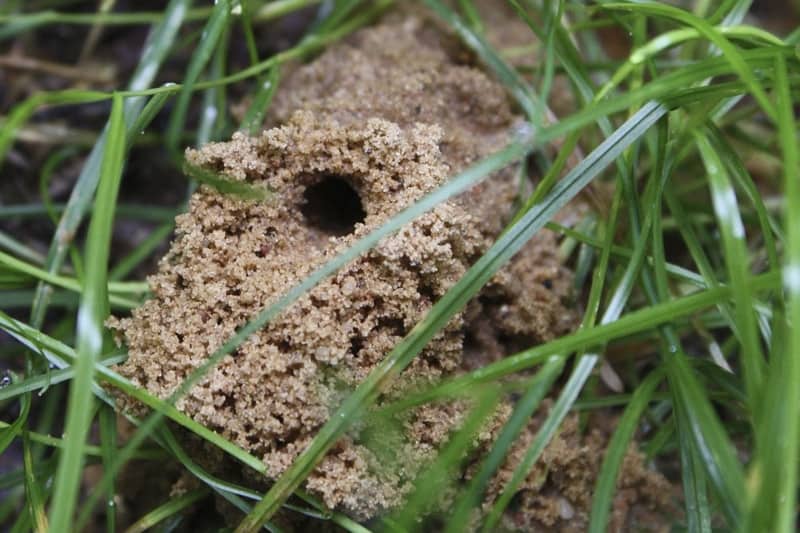
What attracts ground wasps?
Since the basis of adult wasps’ diet is juice and plants nectar, they are attracted to sweet smells of fruits and berries. They can fly to the scent of honey, jam, and even from afar smell the juice that fermented in a fallen apple or pear. As their larvae need protein food, they can be attracted by other insects.
Do ground wasps sting?
Yes, like all wasp species, they can sting in case of a threat to their life or nest. Besides, closely spaced species respond to the smell of the released poison and can join the attack.

Summarizing All the Above
As you can see, ground wasps really do bring many benefits. However, if they settle too close to houses, such a neighborhood can be dangerous. Not only do they behave aggressively, if you are just next to their nest, but you can also accidentally step on their underground housing. And then, multiple bites cannot be avoided. Take appropriate measures to get rid of them and prevent them from appearing on your site in the future.
Have ground wasps ever settled on your backyard? What method did you use to get rid of them? Or maybe you preferred to leave them alone? Share your story with me in the comments below!
References:
- Yellowjackets and Other Social Wasps (University of California Agriculture & Natural Resources):
http://ipm.ucanr.edu/PMG/PESTNOTES/pn7450.html - Getting rid of wasps’ nests (Michigan State University):
https://www.canr.msu.edu/news/getting_rid_of_wasps_nests

